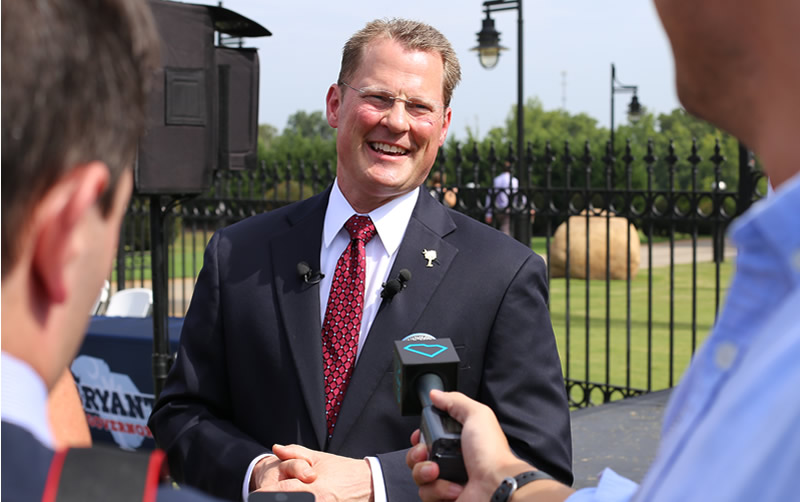
By Lt. Gov. Kevin Bryant, special to Statehouse Report | Political corruption in Columbia is worse now than ever. The simple bribery from the Lost Trust era has been replaced by actual organized crime complete with a godfather and loyal family. Our ethics laws, unfortunately, simply are not up to fighting this kind of crime.
E![]() arlier this year, I authored the South Carolina Anti-Racketeering Act, a bill to fight organized crime by giving our law enforcement the same tool used by the FBI to tackle the Mafia. Thirty-three other states also have this law and it is sponsored by members of both the House and Senate.
arlier this year, I authored the South Carolina Anti-Racketeering Act, a bill to fight organized crime by giving our law enforcement the same tool used by the FBI to tackle the Mafia. Thirty-three other states also have this law and it is sponsored by members of both the House and Senate.
Political lobbyists, following Operation Lost Trust, figured out that they could create a network of power if they served as “consultants” to candidates and elected officials, oversaw their mail and fundraising, and charged them for polling. Successful operatives not only made huge sums of money but also grew their political family.
Once a political family had enough members in the right places, the head of the family then could take on other “clients” with business at the Statehouse with the promise that their family members would act appropriately.
The most successful don, Richard Quinn, eventually became known as The Godfather. He served as the political consultant for several powerful members of the General Assembly and several members of the executive branch, including lieutenant governors, attorneys general and others.
Quinn openly spoke of his “political family,” and I imagine those words were emphasized when he spoke to non-elected clients such as SCANA and other large corporations from whom he extracted millions of dollars, also for “consulting.”

Perhaps the most impressive feat occurred when Quinn engineered the election of his own son, “Rick,” to the S.C. House. The younger Quinn even became majority leader and finished out his service (more on that later) as a member of the Ways and Means Committee. The “Quinndom” wielded tremendous power inside and outside the Statehouse.
Through a sequence of events generated by the corruption investigation of former House Speaker Bobby Harrell, the Quinndom fell under the microscope of a special prosecutor who was named to the case because the original prosecutor, the attorney general, is a Quinn “client.”
The prosecutor uncovered a pattern of The Godfather taking money from special interests and then the elected officials whom he “consulted” acting in ways to benefit those clients. Some of them even admitted it in email.
This led the prosecutor to indict Rick Quinn and other political family members. The prosecutor said that The Godfather “used legislators, groomed legislators and inspired legislators and others to violate multiple provisions of the state ethics act so they could all make money.”
But the indictments were for “misconduct in office,” a very vague and hard to prove standard. The prosecutor added charges of “criminal conspiracy,” but the conspiracy pertains to the misconduct charge; again, vague and hard to prove.
My bill allows for the prosecution of the pattern of behavior, itself. That is the racketeering. Racketeering is at least two acts in furtherance or one or more schemes that have similar intent. The “acts” include violations of the ethics and lobbying laws.
The bill also prevents a lobbyist from working for a campaign for two years and from ever being paid by any state agency. The bill further prohibits a former public official from ever serving as a lobbyist, and they would have to wait two years before working or serving another candidate’s campaign.
More disclosure, more donation caps and even term limits are fine, in and of themselves, and I support them. But, organized crime in South Carolina is smarter than that. We need the right tool for the job, and my anti-racketeering bill is the place to start.
Kevin L. Bryant, a former state senator from Anderson, is the 92nd lieutenant governor of South Carolina. He is running to be the state’s next governor. More: KevinBryant.com.
EDITOR’S NOTE: Through June 12, Statehouse Report is running opinion pieces by gubernatorial candidates with primary challengers. Five Republicans and three Democratic candidates for governor have been invited to submit messages they want to share with voters.
Recent candidate contributors
- GOP, McGill: South Carolina is worth fighting for(April 19)
- GOP, Templeton: “The called me the ‘Buzzsaw’”(May 3)
- GOP, Warren: “We deserve better from our leaders” (May 10)
- DEM, Willis: People run for office for lots of reasons(May 16)
- DEM, Noble: “It is never too late to do what we know is right” (May 21)
- GOP, McMaster: Fighting to achieve our full potential (May 25)


